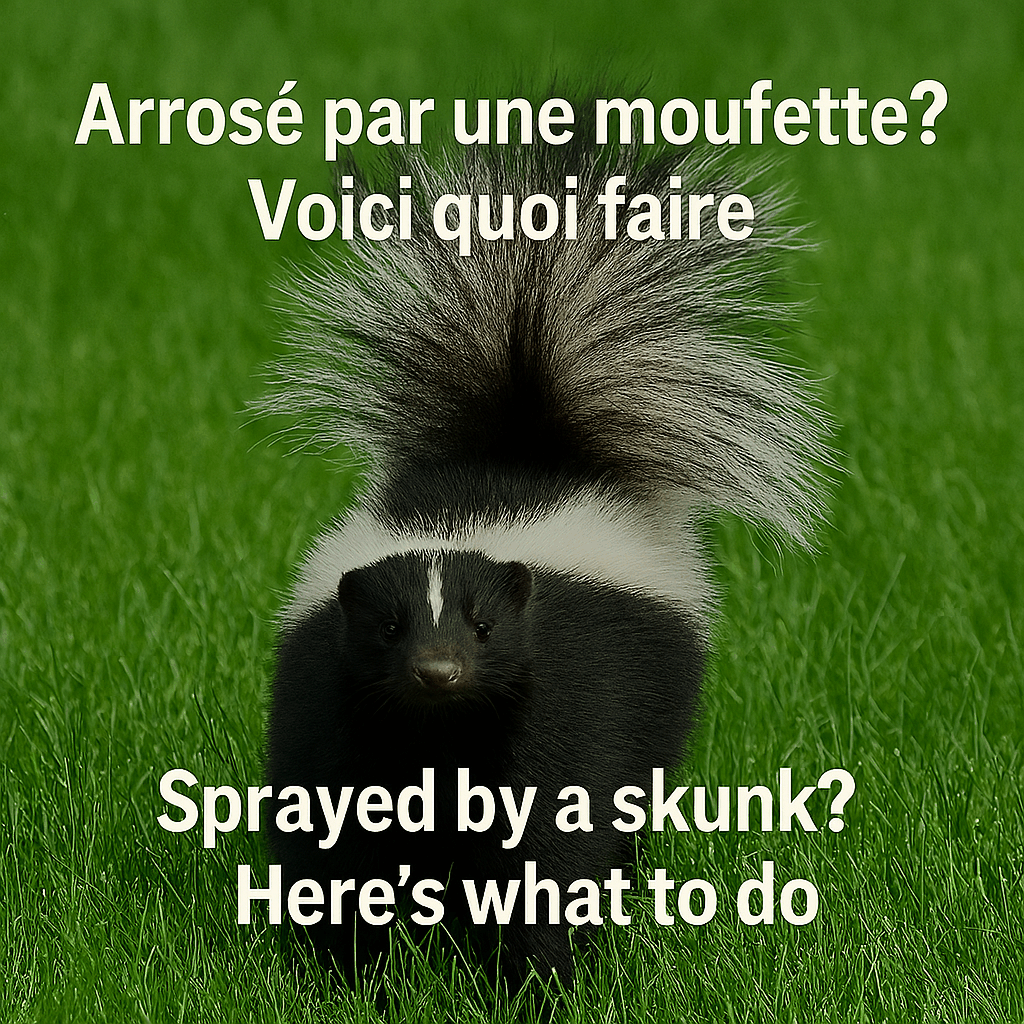🦨 Skunk Smell on Your Dog or Cat: What to Do? | Veterinary Guide
Skunk odor is one of the most persistent problems pet owners and guardians face. It can become embedded in fur, fabrics, and even the air. As veterinary experts, we explain how to react quickly, effectively eliminate skunk odor, and protect your pet's health.
🚨 React quickly: the first essential actions
- Avoid going inside : Keep your pet outside to prevent the smell from permeating your home.
- Protect yourself : Wear gloves and clothes that you can wash immediately.
- Assess his condition : Check if he has been sprayed near his eyes, nose, or mouth. If so, contact your veterinarian.
🧪 What is in the liquid sprayed by the skunk?
The yellow-brown fluid ejected by the skunk is an oily secretion produced by its anal glands. This fluid contains thiols (sulfur compounds) and thioacetates , which are responsible for the foul odor. These substances are extremely volatile and can cause:
- Irritation of the eyes and mucous membranes
- Nausea or vomiting in susceptible animals
- Persistent odor for several days or even weeks
This is why it is crucial to act quickly and use an effective neutralizing solution.
🩺 The effects of skunk odor on your pet's health
Skunk odor isn't just unpleasant—it can cause skin irritation, respiratory problems, and stress in dogs and cats. Prolonged exposure to this odor can also affect their appetite and behavior.
🧼 Homemade recipe to neutralize skunk smell
Forget the tomato juice bath!
Here is an effective solution recommended by veterinarians:
• 1 liter of hydrogen peroxide (3%)
• 1/4 cup baking soda
• 1 teaspoon of mild dish soap
This chemical combination acts directly on the sulfur compounds responsible for skunk odor, neutralizing them without harming the skin.
- Mix just before use (do not store).
- Apply to coat, avoiding eyes.
- Leave on for 5 to 10 minutes, then rinse thoroughly.
- Repeat if necessary, avoiding excessive use to avoid irritating the skin.
📖 True Story: The Case of Bella, a Labrador Retriever
One August morning, Bella, a curious Labrador, wandered too close to a bush… and got sprayed in the face. Her panicked sitter tried tomato juice without success. After consulting their veterinarian, she used the homemade peroxide recipe with a boar bristle brush to work the product in. Within two washes, Bella was odor-free, and her skin showed no irritation.
This story reminds us that the right actions and the right tools make all the difference.
🩺 When to consult a veterinarian?
- If your pet has redness, vomiting, coughing or lethargy .
- If the smell persists despite washing.
- If your pet has been sprayed in the eyes or mouth .
🛠️ Solutions recommended by veterinarians
Although we do not offer products in-store, we would like to share with you the most effective solutions used in veterinary clinics:
- Specialty shampoos : Look for enzymatic formulas designed to neutralize odor-causing sulfur compounds.
- Deodorizing Wipes : Convenient for small affected areas or touch-ups.
- Neutralizing sprays : Useful for impregnated fabrics, collars or cushions.
We recommend that you consult your veterinarian or a specialist pet store to obtain safe and suitable products for your pet.
1. Prevention of Skunk Encounters
- How to Secure Your Yard
- Best times to walk your pet
- Signs a skunk is nearby
2. Possible side effects in animals
- Allergic or skin reactions
- Post-meeting stress
- Behavior to monitor after the incident
3. Quick FAQ
- Can skunk odor be toxic? Yes, in some cases. The thiols and thioacetates in skunk secretion can cause eye irritation , vomiting , or allergic reactions in cats, which are often more sensitive than dogs. If your cat has been sprayed near the face or is showing signs of discomfort, veterinary consultation is strongly recommended.
- How long can the odor persist? Skunk odor can last from days to weeks , depending on the amount of liquid received, coat density, and the products used. Without proper treatment, it can become embedded in fabrics, collars, and even the surrounding air. That's why it's essential to act quickly with a solution designed to neutralize the sulfur compounds responsible for this odor.
-
Can you use homemade products safely?
Yes, but with caution. The homemade recipe with peroxide, baking soda, and mild soap is effective at neutralizing skunk odor, but it must be used with caution. Avoid contact with eyes and mucous membranes, and never store the mixture. For pets with sensitive skin, test on a small area before applying all over the body.
4. Tips for post-incident maintenance
After treating your pet for skunk odor, remember to wash their collar, harness, bed, and even your car if it's contaminated. Skunk odor can seep into the fibers and linger for a long time.
- Wash accessories (collar, harness)
- Clean the affected surfaces (car, cushion, carpet)
-
Deodorize the house if the animal has entered
🎯 Conclusion
An encounter with a skunk can be unpleasant, but with the right actions and products, your pet will quickly regain comfort. Don't hesitate to visit our store for effective and safe solutions. By following these steps, you'll effectively eliminate skunk odor while protecting your pet's health and comfort.

